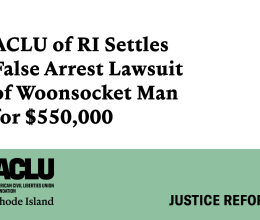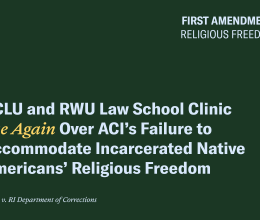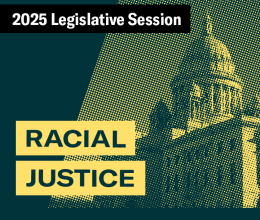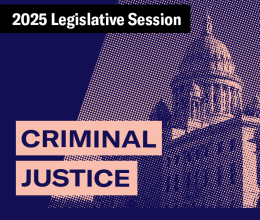In a 36-page report released today, the ACLU of Rhode Island charged that many police departments in the state are doing very little to address the well-documented problem of racial profiling that exists in their communities, and that changes in various law enforcement policies and practices that contribute to the problem are essential to adequately confront the issue.
The report examines the problem from three perspectives: (1) an analysis of statistical data from the second state-wide traffic stop study that was conducted by Northeastern University in 2004-2005; (2) a review of the annual reports that police departments have been required to submit under the state’s Racial Profiling Prevention Act, describing the actions they are taking to address the problem, and (3) an examination of some recent highly-publicized police actions in the state that have put a face on the continued prevalence of racial profiling in Rhode Island. “All three of these examinations,” states the report, “point in the same direction: strong legislative action – action that goes beyond the mere continuation of data collection – is absolutely essential in order to minimize the continued impact of racial profiling in the state.”
Regarding the statistical data, the ACLU report points out that the 2004-2005 traffic stop study conducted by Northeastern University documented only minor reductions in racial disparities compared to the initial two-year study from 2001-2002. Racial minorities were not only disproportionately stopped in virtually every municipality in the most recent study, they remained more than twice as likely as white drivers to be searched even though they were less likely to be found with contraband.
Regarding the police departments’ annual reports, the ACLU report claims that: (1) despite the overwhelming documentation of racial disparities over the course of three years, few police departments have analyzed the vast amount of statistical data they have in order to help them determine how these racial disparities are occurring; (2) some departments have issued perfunctory one-page annual “reports” on their racial profiling work that are word-for-word copies of previous submissions; and (3) at least six police departments that searched minority drivers at more than twice the rate of whites submitted annual reports proclaiming that racial profiling does not exist in their community.
Finally, the report examines the racial profiling implications of some recent highly-publicized incidents in Rhode Island, such as: (1) the I-95 State Police traffic stop of a van carrying 14 Guatemalans, who were detained and then transported to immigration officials, notwithstanding the absence of any allegation of criminal activity; (2) the backyard arrests in Charlestown of seven Mexicans after they failed to provide adequate identification to inquiring police officers; and (3) an incident where the mostly-Hispanic members of the Central Falls high school soccer team were searched by police after Coventry football players accused them of stealing items from the locker room.
The ACLU’s report calls for a series of reforms, such as requiring police to document their “probable cause” or “reasonable suspicion” grounds for conducting a search; banning so-called “pretext stops” of drivers; and restricting police from inquiring about a person’s immigration status or asking motor vehicle passengers for identification in the absence of evidence of criminal activity.
The report argues that adoption of such reforms would benefit both the community and the police, by promoting good community relations that are critical for strong law enforcement; eliminating questionable policies and practices that encourage inaccurate stereotypes about the prevalence of crime by racial minorities; and reducing non-productive police searches that waste limited police resources.








